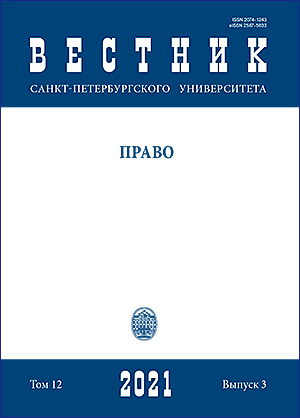The legal culture of Russian society before the challenge of digitalization
DOI:
https://doi.org/10.21638/spbu14.2021.317Аннотация
In the article, the issue of the influence of modern digital technologies on legal culture is analyzed from the perspective of current post-classical methodology, primarily constructivism and anthropocentrism as areas of sociological jurisprudence. The legal culture of Russian society is analyzed based on the historical and anthropological theory of law in conjunction with legal tradition. The vital role of legal culture in the mechanism for constructing social reality is emphasized. The concept of legal culture integrates legal and non-legal elements; it is synthesizing for the individual with its legal status, a society with its legal system, the state with the legislation it adopts and the law enforcement system it forms. It has been shown that the dynamics of legal culture amid digitalization is determined by the relationship of traditional and new legal values, as well as the contradiction between traditionalism and universalism in their axiological aspect. Digitalization affects the individual and collective legal consciousness of legal subjects as carriers of legal culture, thereby determining the dynamics of its fundamental characteristics. The influence of digital technologies on the value content of Russian legal culture is also examined. The dynamics of legal values in a digital society is presented. It is highlighted that the transfer of legal culture between generations is carried out through social relay. Digitalization entails a “digital divide” between generations, disrupts existing mechanisms for the transfer of legal experience and legal values, since the younger generation is much more immersed in a virtual space where they carry out essential social communication than the older generation. In this context, a systematic and focused effort by the state and civil society institutions is needed to take advantage of the opportunities offered by digital technologies for the legal education of young people.
Ключевые слова:
legal culture, digitalization, digital technologies, subject of law, legal consciousness, legal reality, anthropocentrism in law
Скачивания
Библиографические ссылки
Загрузки
Опубликован
Как цитировать
Выпуск
Раздел
Лицензия
Статьи журнала «Вестник Санкт-Петербургского университета. Право» находятся в открытом доступе и распространяются в соответствии с условиями Лицензионного Договора с Санкт-Петербургским государственным университетом, который бесплатно предоставляет авторам неограниченное распространение и самостоятельное архивирование.






